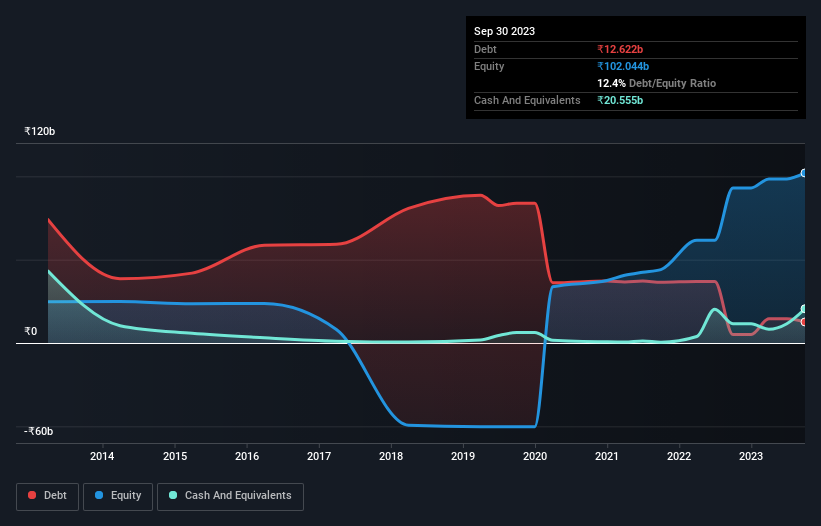Does Patanjali Foods (NSE:PATANJALI) Have A Healthy Balance Sheet?

The external fund manager backed by Berkshire Hathaway's Charlie Munger, Li Lu, makes no bones about it when he says 'The biggest investment risk is not the volatility of prices, but whether you will suffer a permanent loss of capital.' So it seems the smart money knows that debt - which is usually involved in bankruptcies - is a very important factor, when you assess how risky a company is. Importantly, Patanjali Foods Limited (NSE:PATANJALI) does carry debt. But is this debt a concern to shareholders?
When Is Debt A Problem?
Generally speaking, debt only becomes a real problem when a company can't easily pay it off, either by raising capital or with its own cash flow. In the worst case scenario, a company can go bankrupt if it cannot pay its creditors. However, a more frequent (but still costly) occurrence is where a company must issue shares at bargain-basement prices, permanently diluting shareholders, just to shore up its balance sheet. Of course, plenty of companies use debt to fund growth, without any negative consequences. When we think about a company's use of debt, we first look at cash and debt together.
View our latest analysis for Patanjali Foods
How Much Debt Does Patanjali Foods Carry?
The image below, which you can click on for greater detail, shows that at September 2023 Patanjali Foods had debt of ₹12.6b, up from ₹5.07b in one year. But it also has ₹20.6b in cash to offset that, meaning it has ₹7.93b net cash.

A Look At Patanjali Foods' Liabilities
The latest balance sheet data shows that Patanjali Foods had liabilities of ₹34.6b due within a year, and liabilities of ₹1.89b falling due after that. Offsetting these obligations, it had cash of ₹20.6b as well as receivables valued at ₹9.84b due within 12 months. So its liabilities outweigh the sum of its cash and (near-term) receivables by ₹6.08b.
This state of affairs indicates that Patanjali Foods' balance sheet looks quite solid, as its total liabilities are just about equal to its liquid assets. So it's very unlikely that the ₹546.9b company is short on cash, but still worth keeping an eye on the balance sheet. Despite its noteworthy liabilities, Patanjali Foods boasts net cash, so it's fair to say it does not have a heavy debt load!
But the bad news is that Patanjali Foods has seen its EBIT plunge 16% in the last twelve months. We think hat kind of performance, if repeated frequently, could well lead to difficulties for the stock. The balance sheet is clearly the area to focus on when you are analysing debt. But ultimately the future profitability of the business will decide if Patanjali Foods can strengthen its balance sheet over time. So if you're focused on the future you can check out this free report showing analyst profit forecasts.
Finally, a business needs free cash flow to pay off debt; accounting profits just don't cut it. While Patanjali Foods has net cash on its balance sheet, it's still worth taking a look at its ability to convert earnings before interest and tax (EBIT) to free cash flow, to help us understand how quickly it is building (or eroding) that cash balance. In the last three years, Patanjali Foods's free cash flow amounted to 33% of its EBIT, less than we'd expect. That's not great, when it comes to paying down debt.
Summing Up
While it is always sensible to look at a company's total liabilities, it is very reassuring that Patanjali Foods has ₹7.93b in net cash. So we don't have any problem with Patanjali Foods's use of debt. The balance sheet is clearly the area to focus on when you are analysing debt. However, not all investment risk resides within the balance sheet - far from it. For example - Patanjali Foods has 1 warning sign we think you should be aware of.
At the end of the day, it's often better to focus on companies that are free from net debt. You can access our special list of such companies (all with a track record of profit growth). It's free.
New: Manage All Your Stock Portfolios in One Place
We've created the ultimate portfolio companion for stock investors, and it's free.
• Connect an unlimited number of Portfolios and see your total in one currency
• Be alerted to new Warning Signs or Risks via email or mobile
• Track the Fair Value of your stocks
Have feedback on this article? Concerned about the content? Get in touch with us directly. Alternatively, email editorial-team (at) simplywallst.com.
This article by Simply Wall St is general in nature. We provide commentary based on historical data and analyst forecasts only using an unbiased methodology and our articles are not intended to be financial advice. It does not constitute a recommendation to buy or sell any stock, and does not take account of your objectives, or your financial situation. We aim to bring you long-term focused analysis driven by fundamental data. Note that our analysis may not factor in the latest price-sensitive company announcements or qualitative material. Simply Wall St has no position in any stocks mentioned.
About NSEI:PATANJALI
Patanjali Foods
Engages in the processing of oil seeds and refining crude oil for edible use in India.
Flawless balance sheet with reasonable growth potential.


